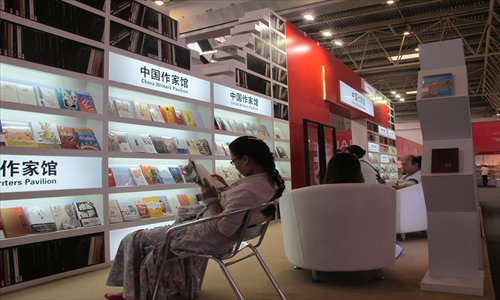Journey West proves difficult

Chinese literature sits on shelves, waiting to be picked up
BIBF, or Beijing International Book Fair, should be an ideal place to sell Chinese literature, with 2,000 publishers from over 50 countries and regions participating. The fair, which took place from August 29 to Sunday, attracted hordes of readers.
But going through the exhibition hall reveals that stands of foreign publishers like Penguin were crowded, while stands for Chinese publishers were desolate.
To some extent, this is reflective of the gap in the book market between China and Western countries, and Chinese literature's inability to tap into a mass international market. Though the translation and publication of Chinese contemporary literature has developed quickly over the years, the numbers are still disproportionate.
"The influence is limited compared to the introduction of foreign literature," Han Xi with Beijing Xiron Books, a private book company, told the Global Times.
Imbalanced market
An exhibition board of People's Literature Publishing House (PLPH) displayed the covers of several Chinese novels that it successfully introduced abroad in recent years, including Ai Mi's The Love of the Hawthorn Tree, Bi Feiyu's Massage and Shen Congwen's Border Town.
PLPH, established in 1951, is one of the largest publications that exports Chinese literature and brings in foreign literature. On average, it introduces about 20 Chinese contemporary literary works every year.
Zeng Shaomei, from PLPH, told the Global Times that it is difficult to predict tastes, as the success of certain books do not translate cross cultures. But popularity is important.
"[Publishers] have no time to read a whole book, so the writer's fame and a novel's domestic popularity matters." Zeng said.
She used The Love of the Hawthorn Tree as an example.
"At the moment, it has been exported to 17 countries and regions, becoming popular after Zhang Yimou's movie adaptation came out in 2010," she said.
Other writers, like Bi Feiyu, are coveted, after winning awards, she added.
According to the Annual Report on China's Literature (2011-2012), in 2011, over 4,000 long novels were published, with an increase both in quantity and quality.
But among the emerging Chinese writers in recent years, only a few saw their works circulated internationally, such as Yu Hua, Mo Yan, Wang Anyi and Alai.
Foreign knowledge of Chinese literature usually stops with the four classics.
In an international literary translation seminar held last month by Chinese Writers Association, translators and scholars agreed that Chinese literature in the 21st century held a weak international presence.
Han from Xiron Books told the Global Times that there is no lack of good writers and literary works in China at present; the key is to get over cultural and language barriers.
Western bias
Zeng Shaomei told the Global Times that it is most difficult to promote Chinese literature in English-speaking countries.
In the US literature market, only 3 percent includes books translated from other languages, among which Chinese contemporary literature holds a very small proportion. Even in Germany, a country with many translations, Chinese literature has a small presence.
South Asian countries are influenced dominantly by English and Western culture; European and American literature dominates South Korea.
Chinese literature also suffers from prejudice caused by the discrepancy in culture and politics.
"It is widely accepted bias in the West that Chinese writers cannot create great literature because of a lack of freedom," Jin Renshun, a writer from Jilin Province, told the Global Times.
"They like literature that touch upon controversial politics in China. Subversive writers are preferred."
Such preference prevents Chinese literature from being recognized and understood.
Translating is also a big obstacle, as there is a lack of translators abroad. Some works are translated from other languages rather than the original Chinese, a cause of inaccuracy.
Concentrating efforts
On August 28, the 6th Special Book Award of China was held in Beijing to reward international translators who made great strides in introducing, translating and publishing Chinese books.
Established in 2005, the award is part of a national strategy to encourage the push for Chinese culture abroad.
To date, 27 awards have been given out, including one to US translator Howard Goldblatt for his translation of Wolf Totem and one to German sinologist Monika Motsch.
In recent years, Chinese contemporary literature has seen an increase in translation in countries like France, Germany, the UK and Japan. Effort is being made by the Chinese government as well as industry insiders.
Beijing Normal University cooperated with University of Oklahoma in 2010 to promote Chinese literary work, establishing the English magazine, Chinese Literature Today. The two plan to publish 10 translated pieces of Chinese literature within the next three years.
People's Literature magazine has published three English editions.
A series of activities were held at this year's BIBF to promote Chinese literature. One is the cooperation between Sweden and Chinese children literature publisher, Daylight Publishing House.
They are launching a project in which two writers from China and Sweden will write stories on the same topic and have their products translated and published in both countries.
Han said that the current publishing situation is related to China's cultural positioning in the world.
"The output of Chinese literature helps Western readers have a more objective understanding of China, but it needs to be combined with other levels of national marketing."
According to Jo Lusby, managing director of Penguin China, approximately 10 titles per year from China are translated and published by Penguin. They continue to publish more books from Chinese into English than any other foreign language.
"Establishing Chinese literature on the world stage will be a gradual process. As more writers are invited to international literary festivals, and readers are given the opportunity to encounter these new writings, the cultural gap between writers in China and readers in the West will get smaller," she said.